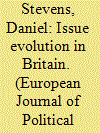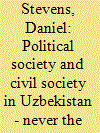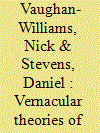|
|
|
Sort Order |
|
|
|
Items / Page
|
|
|
|
|
|
|
| Srl | Item |
| 1 |
ID:
120511


|
|
|
|
|
| Publication |
2013.
|
| Summary/Abstract |
While Carmines and Stimson's work on issue evolutions has prompted research showing the dynamics and effects of new party alignments on abortion, religion, gender and cultural issues, this research has all centred on the United States. This article examines issue evolution in Britain. Using evidence on the timing of changes in elite positions from Comparative Manifestos Group data, and survey data on public attitudes to the European Union with a longer historical sweep than heretofore, the article finds strong evidence that the European issue has followed an issue evolution path, though with distinct dynamics contingent on the pace of elite re-positioning. Thus, this article extends the theory of issue evolution to a parliamentary political system and demonstrates the responsiveness of the public to elite cues, while also providing additional insights from a unique case in which elites have staked out distinct positions not once, but twice.
|
|
|
|
|
|
|
|
|
|
|
|
|
|
|
|
| 2 |
ID:
177947


|
|
|
|
|
| Summary/Abstract |
Differences between women and men in perceptions of security threats are firmly established in public opinion research, with the ‘male warrior’ and the ‘worried woman’ two well-documented stereotypes. Yet, we argue in this article, the differences are not as well understood as such labels, or the search for explanations, imply. One reason for this is the lack of dialogue between public opinion research and feminist security studies. In bringing the two fields into conversation by analysing mixed methods research data gathered in Britain, we suggest that while the extent of the gender gap in opinions of security is overstated, the gaps that do exist are more complex than previously allowed: men and women define ‘security’ in slightly different ways; women tend to identify more security threats than men not necessarily because they feel more threatened but due to a greater capacity to consider security from perspectives beyond their own; women are more confident about the government's ability to deal with security threats in the future but not simply because of greater faith in government than men. This complexity implies a need to revisit assumptions, methods, and analytical approaches in order to develop the field of gender and security further.
|
|
|
|
|
|
|
|
|
|
|
|
|
|
|
|
| 3 |
ID:
067073


|
|
|
| 4 |
ID:
080400


|
|
|
| 5 |
ID:
143310


|
|
|
|
|
| Summary/Abstract |
Citizens increasingly occupy a central role in the policy rhetoric of British National Security Strategies, and yet the technocratic methods by which risks and threats are assessed and prioritized do not consider the views and experiences of diverse publics. Equally, security studies in both ‘traditional’ and ‘critical’ guises has privileged analysis of elites over the political subject of threat and (in)security. Contributing to the recent ‘vernacular’ and ‘everyday’ turns, this article draws on extensive critical focus-group research carried out in 2012 across six British cities in order to investigate (1) which issues citizens find threatening and how they know, construct and narrate ‘security threats’, and (2) the extent to which citizens are aware of, engage with and/or refuse government efforts to foster vigilance and suspicion in public spaces. Instead of making generalizations about what particular ‘types’ of citizens think, however, we develop a ‘disruptive’ approach inspired by the work of Jacques Rancière. While many of the views, anecdotes and stories reproduce the police order, in Rancière’s terms, it is also possible to identify political discourses that disrupt dominant understandings of threat and (in)security, repoliticize the grounds on which national security agendas are authorized, and reveal actually existing alternatives to cultures of suspicion and unease.
|
|
|
|
|
|
|
|
|
|
|
|
|
|
|
|
| 6 |
ID:
141847


|
|
|
|
|
| Summary/Abstract |
This paper argues that the effects of war as a performance issue in elections are different for a right-wing than a left-wing leader. War is consistent with the reputation of right-wing, hawkish governments, but does not fit the reputation of left-wing, dovish governments, and necessitates a turn away from the domestic issues the public expects left-wing governments to prioritize. War therefore varies in its effects on perceptions of right-wing and left-wing leaders. War also provides more temptation for left-wing supporters to defect to the incumbent under a right-wing government than for right-wing supporters to defect under a left-wing government. The War in Iraq and elections in the United States and UK provide a unique case to test these arguments. The results confirm that Blair paid a higher political price as a left-wing leader, because perceptions of Blair's trustworthiness became central to evaluations of him. Conversely, positive perceptions of strength became central to evaluations of Bush as a right-wing leader. The war also had asymmetric effects on supporters of the opposition party in the UK that resulted in higher costs to Blair. These findings imply that the risks of going to war are greater for left-wing leaders.
|
|
|
|
|
|
|
|
|
|
|
|
|
|
|
|
|
|
|
|
|